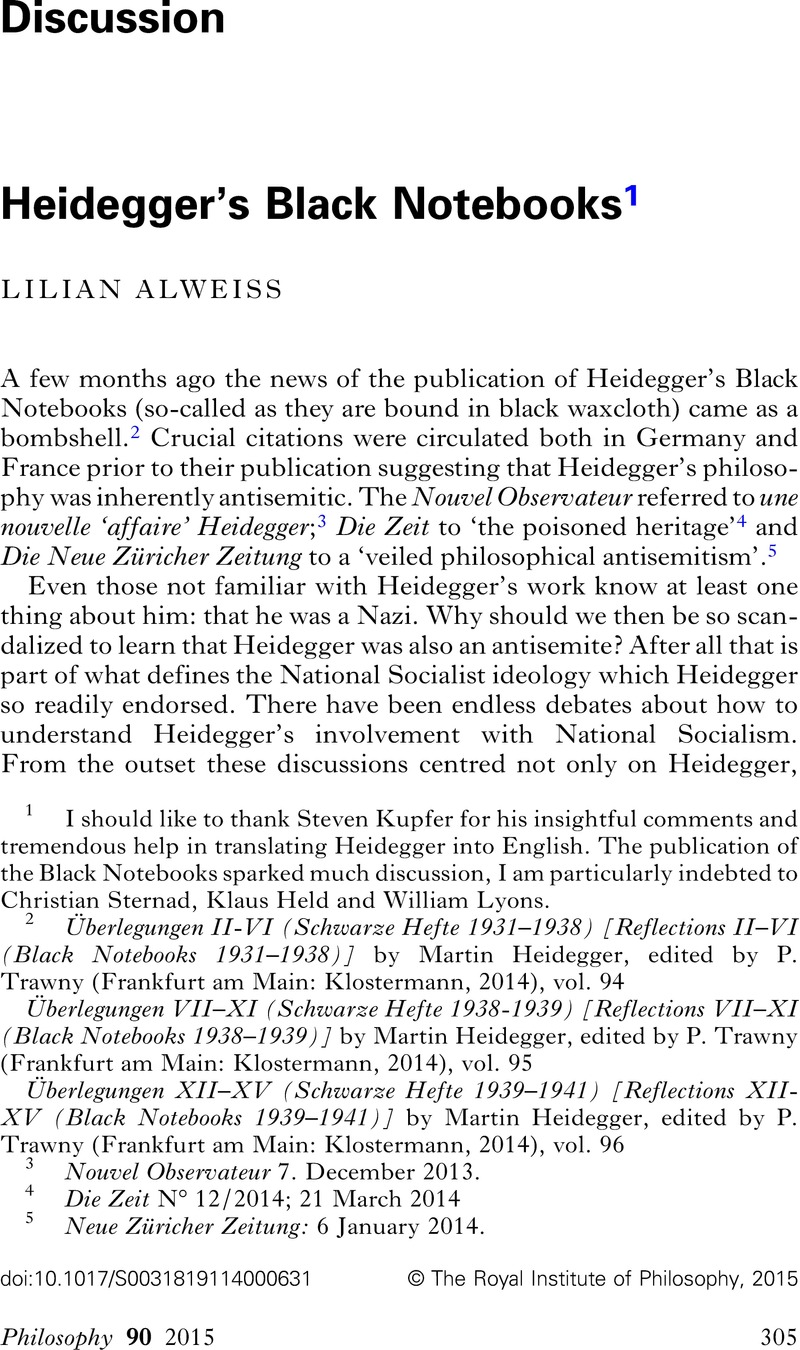Article contents
Heidegger's Black Notebooks1
Published online by Cambridge University Press: 12 March 2015
Abstract

- Type
- Discussion
- Information
- Copyright
- Copyright © The Royal Institute of Philosophy 2015
Footnotes
I should like to thank Steven Kupfer for his insightful comments and tremendous help in translating Heidegger into English. The publication of the Black Notebooks sparked much discussion, I am particularly indebted to Christian Sternad, Klaus Held and William Lyons.
References
2 Überlegungen II-VI (Schwarze Hefte 1931–1938) [Reflections II–VI (Black Notebooks 1931–1938)] by Heidegger, Martin, edited by Trawny, P. (Frankfurt am Main: Klostermann, 2014), vol. 94Google Scholar
Überlegungen VII–XI (Schwarze Hefte 1938-1939) [Reflections VII–XI (Black Notebooks 1938–1939)] by Heidegger, Martin, edited by Trawny, P. (Frankfurt am Main: Klostermann, 2014), vol. 95Google Scholar
Überlegungen XII–XV (Schwarze Hefte 1939–1941) [Reflections XII-XV (Black Notebooks 1939–1941)] by Heidegger, Martin, edited by Trawny, P. (Frankfurt am Main: Klostermann, 2014), vol. 96Google Scholar
3 Nouvel Observateur 7. December 2013.
4 Die Zeit N° 12/2014; 21 March 2014
5 Neue Züricher Zeitung: 6 January 2014.
6 Faye, Emmanuel: Heidegger: The Introduction of Nazism into Philosophy in Light of the Unpublished Seminars of 1933–1935, Smith, Michael B. (tr.) (Yale UP, 2009)Google Scholar.
7 Hugo Ott for examples maintained that Farias' methodology was unacceptable in historical research. (Cf. Paths and wrong Paths (N & K), 138). Fedier, in turn, accused Faye of a lack of competence in German and of faking or falsifying quotations. Cf Fédier, François (ed.), Heidegger, à Plus Forte Raison (Paris: Fayard, 2007)Google Scholar.
8 Heinrich Wiegand Petzet: Encounters and Dialogues with Martin Heidegger, 1929–1976 (1983), 37. See also de Towarnicki, Frederic, A la Rencontre de Heidegger. Souvenirs d'un Messager de la Forêt-Noire (Gallimard 1993), 125Google Scholar
9 Heidegger, M., “‘Only a God Can Save Us”, The Spiegel Interview (1966)’, trans. Richardson, W.J. in Heidegger: The Man and Thinker (ed.) Sheehan, T. (Chicago Precedent Press, 1981), 45–64Google Scholar
10 Cf. ‘Letter from Heidegger to Marcuse of 20 January 1948’, trans. R. Wolin in New German Critique, No. 53 (1991), 30–31.
11 Trawny, Peter: Heidegger und der Mythos der jüdischen Weltverschwörung (Klostermann, 2014)Google Scholar. To prove his point, Trawny draws on anecdotal evidence. In his autobiography, Karl Jaspers reported that he remembered discussing the ‘pernicious Protocols of the Elders of Zion’ with Heidegger. But far from treating them with the contempt they deserved, Heidegger expatiated on the threat posed by a ‘dangerous international alliance of Jews’. (Trawny (2014): 46).
12 As defense Fédier argues that Heidegger's expressed antisemitism just reflects a certain Zeitgeist which would not have been seen as offensive at the time. To illustrate his point he asks: ‘If I say something about the Jews today and refer to their humour and spirituality, am I in danger of being called an antisemite?’ (Fédier in an interview with Die Zeit 18 January 2014. Fédier thereby ignores that Heidegger does not simply repeat ideas expressed at the time but he integrates them into his philosophical thinking. Surely more is involved than blindly reiterating antisemitic views prevalent at the time.
13 According to an interview in the weekly newspaper Die Zeit, Silvio Vietta, the son of one of Heidegger's many mistresses, was the owner of the Notebook. He sold it to the Deutsche Literaturarchiv Marbach in March 2014 so that it could be included in Heidegger's Collected Works. Cf. Die Zeit: 22 January 2014 and N° 05/2014 and 30 January 2014.
14 Hochmeister, Lutz: Heideggers Testament; Der Philosoph, Der Spiegel und die SS (Ulstein, 2014)Google Scholar.
15 “Todtnauberg” in Celan, Paul: Gesammelte Werke Zweiter Band Gedichte II. Suhrkamp: 1983: 255Google Scholar.
- 1
- Cited by




